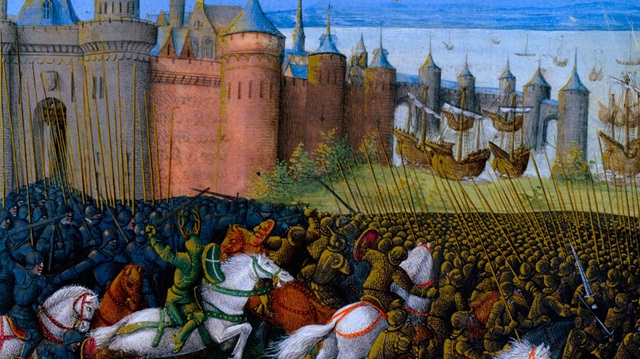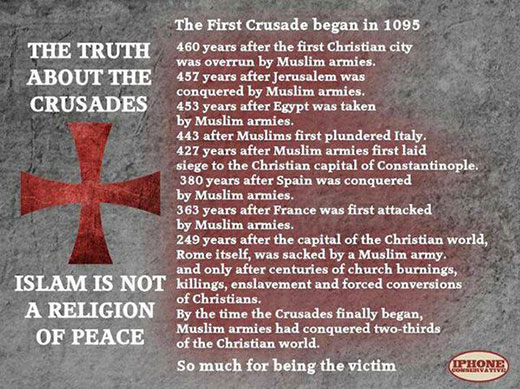The Last Crusade, 1996-1999 February 16, 2016
Author: Beach Combing | in : Contemporary, Medieval , trackback
Sorry!!!
Beach is always curious about the present’s manipulation of the past and there are few subjects that have been manipulated more than the Crusades. Those men and women who set off towards the Holy Land, in 1095 have been cast in almost every imaginable role in the last two hundred years. They have been made into murderers, heroes, proto-Nazis, fools of God, fanatics, saints and hard-headed businessmen. Listening to modern Islamists talk about the crusades is a particularly instructive experience; but look out too for homegrown European Jeremiads. Among the most interesting, certainly the most serious of these western reactions to crusade, there was the Walk of Reconciliation which took place between 1996 (Easter Sunday) and 1999, the nine hundredth anniversary of the crusade’s ‘arrival’ (ahem) in Jerusalem. Christians on the walk, strolled, in shifts, all the way from Cologne to the holy city. The route was split up into sections and several score walked at a time with almost five hundred making it up the Temple Mount, July 15 1999. The marchers wore tee-shirts and baseball caps saying ‘I’m sorry’ in Arabic and Hebrew. They also handed out leaflets to, one would imagine, bemused passers-by.
Nine hundred years ago, our forefathers carried the name of Jesus Christ in battle across the Middle East. Fuelled by fear, greed and hatred, they betrayed the name of Christ by conducting themselves in a manner contrary to His wishes and character. The Crusaders lifted the banner of the Cross above your people. By this act, they corrupted its true meaning of reconciliation, forgiveness and selfless love. On the anniversary of the first Crusade, we also carry the name of Christ. We wish to retrace the footsteps of the Crusaders in apology for their deeds and in demonstration of the true meaning of the Cross. We deeply regret the atrocities committed in the name of Christ by our predecessors. We renounce greed, hatred and fear, and condemn all violence done in the name of Jesus Christ.
Beach finds all this simultaneously silly and moving. Silly because the crusades were a Christian jihad, created to fight a still expanding Islamic world. Silly because the turn-the-other-cheek version of Christianity, suggested in this apology, was abandoned after Origen. It has not been at the heart of Christian civilization over the past two thousand years: hence Christianity’s survival. The crusades were an organic outgrowth of a tradition that many ‘holy’ men including St Francis and St Louis were ready to sign up to: in fact, one of the most remarkable things about the crusades is the lack of contemporary criticism of what was, after all, a bold new concept in Christendom. Early modern slavery was a betrayal of the western Christian tradition, a cancer within: Europe had given up on slavery only to return to it once sugar cane grew high in the Americas. Now that would be a march (or a sail?) worth going on. The Crusades were not a betrayal: they were an integral part of an imperfect but promising civilization.
The march is moving because rightly or wrongly many of those who the marchers met en route clearly felt the need to be apologized to: either because they had some special insight; or because they were the victims of a misrepresentation of the crusades in their own countries. There is, too, no question that the crusaders murdered (by their own moral standards as well as ours) some of those they met from the Jewish communities on the Rhine to Jewish and Muslim populations within Jerusalem, though the numbers of the dead continue to be debated. The march is moving, finally, because young men and women adopted an extreme but a not unpleasant form of Christianity in an age when going to Church on Sunday has become a radical act. Which would you prefer happy-clappy Christians giving out apologies in Istanbul or sincere young men from the west decapitating each other on youtube videos?
Of course, a lot has happened since 1999 not least 11 Sept. The tone of debate has changed and now, instead, of reconciliation marches we get the above graphic. The information given is essentially correct. It is also true that Islam has a more aggressive heart than Christianity: Islam is better integrated with the state; the gospels are no governmental plan. But the only comparison that is worth making is between Islamic and Christian civilizations, a rather different thing from Islam and Christianity. If Christians were not burning Muslim cities, c. 700, it was not because they did not want to, it was because they did not have the physical resources to do so.
It would be interesting to hear anyone who went on the march: Beach was particularly pained by the lack of photographs online, drbeachcombing AT yahoo DOT com



